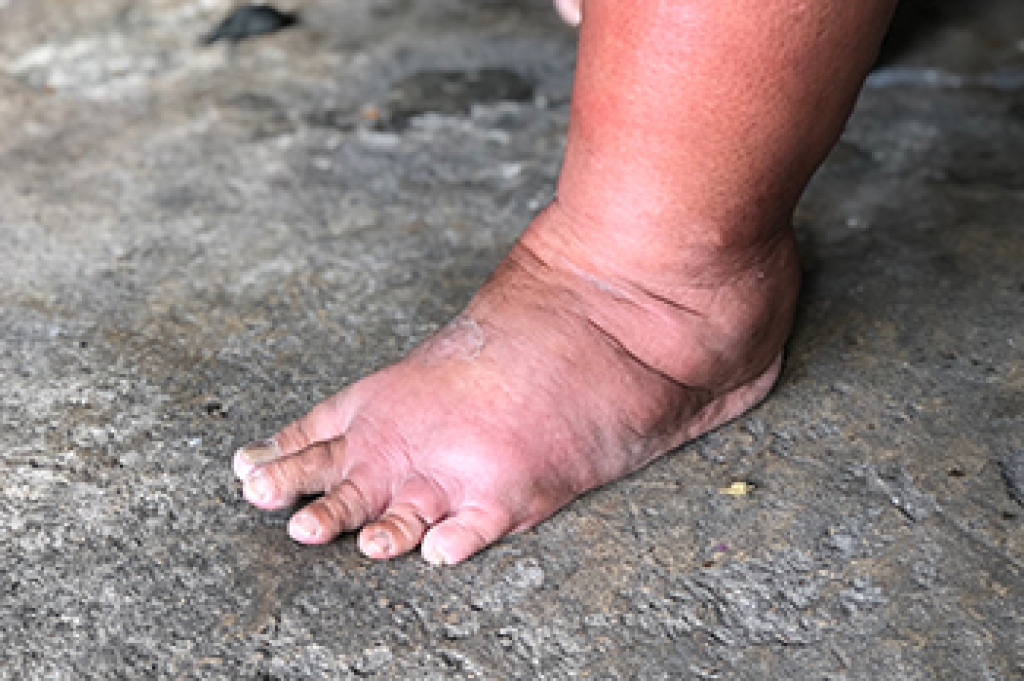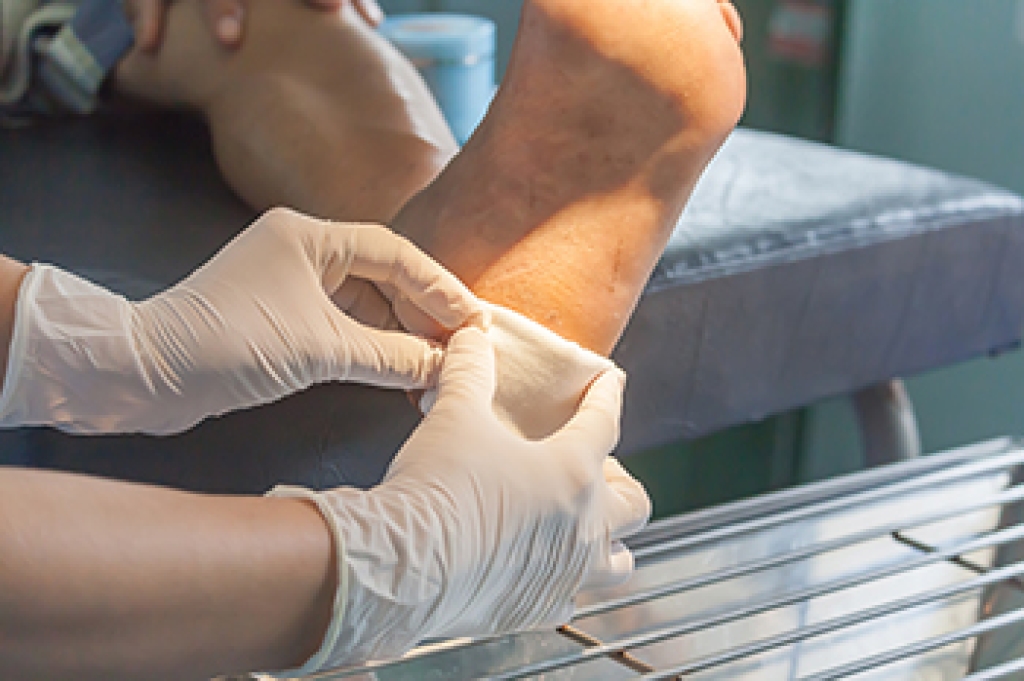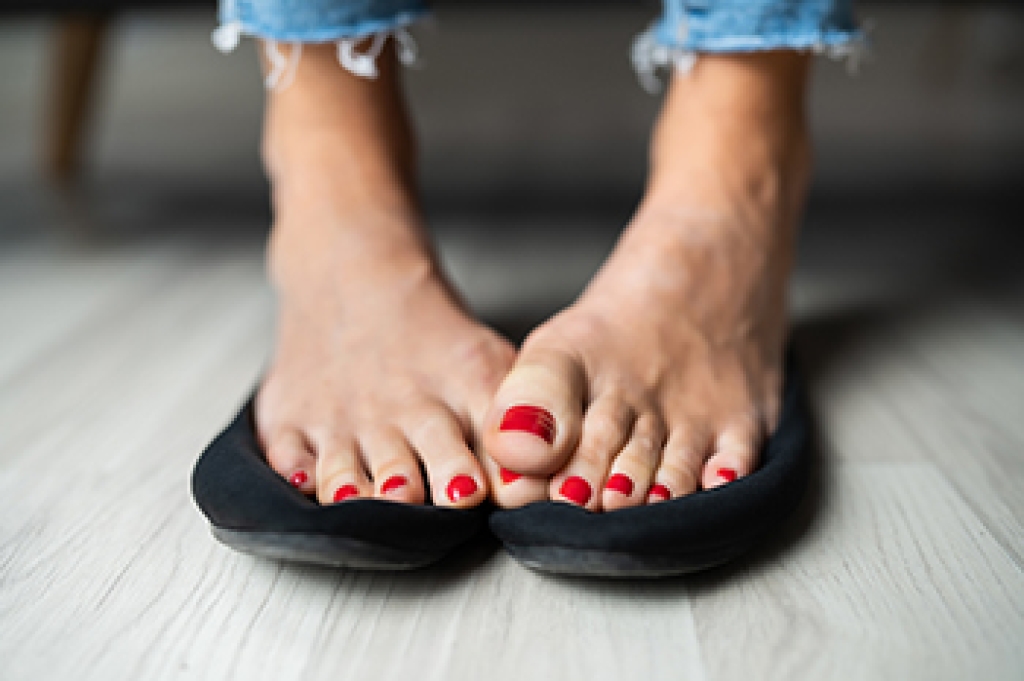Swelling of the Feet in the Summertime

When the weather is hot and you have been on your feet all day, you can get uncomfortable swelling in your feet and ankles. This is a common occurrence and becomes more likely as you age. Edema is the medical name for swelling in the lower extremities. It is the result of abnormal fluid buildup. In addition to heat, edema can be brought on by things like excessive salt intake or drinking alcohol. Those who are overweight or suffer from venous insufficiency, where the veins in the legs have trouble pushing blood back toward the heart, can be more prone to foot swelling. Certain medications can also contribute to edema, such as antidepressants, steroids, and hormones. Edema can have more serious causes, such as those involving underlying health conditions like a blood clot in the leg, an injury, or failure of the heart, kidneys, or liver. If you suffer from swelling of your feet and do not know the cause, or if the swelling does not improve with rest and cooling down, it is suggested that you consult with a chiropodist to help you find out the cause and how to best deal with it.
Summer is the season for many foot and ankle issues. If you’re suffering from a foot or ankle problem, please consult with one of the chiropodists from The Footcare Centre. Our chiropodists can help you maintain the health of your lower limbs and your mobility.
Common Summer Foot Problems
- Athlete’s foot
- Toenail fungus
- Plantar warts
- Foot and ankle injuries
- Bunions
- Hammertoes
- Heel pain
- Cracked heels
- Sunburns
- Blisters
Prevention
- Wear supportive shoes and avoid flip-flops
- Maintain good foot hygiene
- Exfoliate and moisturize the heels
- Apply sunscreen to the feet and ankles
- Wear shoes in public areas like swimming pools, locker rooms, and showers
If you have any questions, please feel free to contact our office located in . We offer the newest diagnostic and treatment technologies for all your foot care needs.
What Are Foot Ulcers?

A foot ulcer is any open sore on the foot whether it is shallow or deep. People who have diabetes, poor circulation, and structural foot abnormalities that cause pressure spots on the feet are more apt to develop foot ulcers. Diabetics often have peripheral neuropathy or nerve damage which interferes with the feeling of pain or discomfort in their feet. Such people can accidentally injure their feet and not be aware of it. The visually impaired may not be able to examine their feet and catch problems. Foot ulcers can be slow to heal if circulation is a problem and may become infected, which can show as an abscess with pus. Such infections can lead to gangrene and amputation if not tended to promptly. If you have a foot ulcer, it is strongly suggested that you visit a chiropodist for a proper examination and offer a correct treatment plan.
Wound care is the process of treating and preventing wounds on the feet. This is especially important if you have diabetes, as diabetic foot wounds are common and can lead to serious complications when left untreated. To learn more about proper wound care, please consult with one of the chiropodists from The Footcare Centre. Our chiropodists will assess your condition and provide you with quality foot and ankle treatment.
Why Is Wound Care Important for Diabetics?
While wound care is important for maintaining the health of your feet, it is especially important for people with diabetes. This is because diabetics often suffer from poor blood circulation, causing foot wounds to heal very slowly or not to heal at all. Diabetics also frequently suffer from neuropathy or nerve loss. This means no matter how big or little the wound, they might not feel it on their foot. If the wound becomes severely infected, amputation may be necessary. This is why it is imperative that diabetics complete daily foot checks.
Wound Care Basics
The best way to care for wounds is to prevent them in the first place. It is recommended that people with diabetes perform a daily examination of their feet to locate cuts, scrapes, sores, or wounds. Early detection allows for ample time to treat the wounds and prevent further complications. If you notice a wound at home, you can clean it using water, apply an antibiotic ointment, and cover the wound with a clean bandage. Seeing a chiropodist, who can examine your feet thoroughly and treat any existing wounds, can also help you maintain proper foot health.
If you have any questions, please feel free to contact our office located in . We offer the newest diagnostic and treatment technologies for all your foot care needs.
Abnormal Foot Sweat

If feet sweat excessively, especially when participating in high intensity exercise, it may be from a condition called plantar hyperhidrosis. Besides sweaty feet being uncomfortable and embarrassing, this condition can also increase the risk of other problems, including foot odor, athlete’s foot, and toenail fungus. Things that can help with sweaty feet include wearing socks made of breathable material, like cotton, using antifungal powder or cornstarch to help keep feet dry and odor-free, and choosing shoes that fit properly and are right for the activity being done. Shoes made of patent leather or plastic should be avoided, as they trap sweat inside the shoe. If your feet sweat excessively and it is causing you discomfort or embarrassment, it is suggested that you see a chiropodist for a proper diagnosis and treatment options.
Plantar hyperhidrosis is a medical condition that causes excessive sweating of the feet. This problem is not only embarrassing but can also cause a variety of foot health problems if left untreated. Fortunately, there are many effective treatments available for plantar hyperhidrosis. If you have very sweaty feet, please consult with one of the chiropodists from The Footcare Centre. Our chiropodists can help you maintain the health of your lower limbs and your mobility.
Signs & Symptoms
- Excessive foot sweat
- Sweating from both feet
- Slipping out of shoes due to sweat
- Damp footprints
- Ruined shoes
- Frequent foot infections
- Friction blisters
- Whitish foot color
- Wrinkly, pruney feet
- Cold feet
- Strong odor
Treatment Options
- Topical antiperspirants - Powders, creams, or gels that are applied directly to the feet to prevent sweating; can be over the counter or prescription strength
- Oral medications - Pills taken by mouth to reduce sweating temporarily
- Iontophoresis - A procedure that uses a mild electrical current conducted through water to reduce activity in hyperactive sweat glands
- Botox - Injected into the feet to prevent activation of sweat glands
In addition to these treatment options, footwear modifications, such as wearing shoes and socks made of breathable or moisture-wicking materials, are also suggested. If you have any questions, please feel free to contact our office located in . We offer the newest diagnostic and treatment technologies for all your foot care needs.


